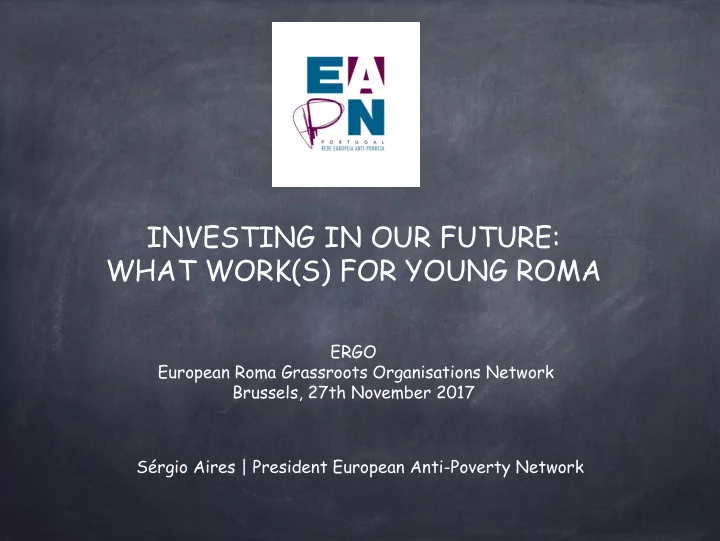

INVESTING IN OUR FUTURE: WHAT WORK(S) FOR YOUNG ROMA ERGO European Roma Grassroots Organisations Network Brussels, 27th November 2017 Sérgio Aires | President European Anti-Poverty Network
CONTENTS 1. The European Anti-Poverty Network 2. Roma Discrimination in Portugal 3. Presentation of two campaigns adressing Discrimination: * Singular of the Plural * National campaign on access to education
EAPN 2017: 31 NATIONAL NETWORKS (27 UE + Serbia and Macedónia + 2 EFTA) Austria | Belgium | Bulgaria | Croatia | Cyprus Czech Republic | Danemark | Estonia | Finland France | Macedonia | Germany | Greece Hungary | Italy | Ireland | Latvia | Lithuania | Luxemburg Malta | Netherlands | Poland | Portugal | Romania | Serbia Slovakia | Spain | Sweden | Slovenia | United Kingdom European Free Trade Association (EFTA): Iceland | Norway
2017: 18 EUROPEAN ORGANISATIONS AGE Platform Europe (AGE) ATD Fourth World BABELEA Caritas Europa EMMAUS Europe Eurochild EURODIACONIA European Consumer Debt Network (ECDN) European Federation of National Organisations Working with the Homeless (FEANTSA) European Federation of Food Banks (FEBA) European Federation for Street Children (EFSC) European Network against Racism (ENAR) International Association of Charities (AIC) International Federation of Social Workers (IFSW) Mental Health Social Exclusion Europa (SMES Europa) Platform for International Cooperation on Undocumented Migrants (PICUM) Salvation Army
ROMA Discrimination in Portugal For EAPN Portugal, since 1991, Roma Communities were always a priority. Intervention on social mediation, supporting Roma Organizations, development of different projects in areas such as education and health. But the biggest attention had been given to the fighst against institutional discrimination and lobbying for positive action and policies 5 centuries in the country Around 50.000 people No data discrimination but according to several studies and social intervention projects: huge housing, health and educational problems But the strongest barrier to social inclusion is: DISCRIMINATION namely on access to services and employment
The Singular of the Plural 20 professions. 20 persons. 20 Roma With which purpose? To question a plural – the Roma -, supposedly representing a mostly only imaginary collective entity, which tries to classify the general ignoring the parts. And, largely, responsible for the maintenance of negative stereotypes feeding social discrimination and its evil consequences.
The Singular of the Plural Contrary to what the majority of the citizens believe, although Roma Communities recognise themselves belonging to a common culture, they are heterogeneous concerning their composition, social situation, life style, values and behaviours. Most of the times, the common sense generalizations, take in consideration common specific characteristics which are assigned to these citizens but that in reality don’t coincide with the majority of the individual realities of these persons, or that are based in social representations out of touch in space and time.
The Singular of the Plural That’s why we call this exhibition and publication the “Singular of the plural” . This exhibition and publication presents 20 testimonies showing different life paths, desires and expectations contradicting the common – and negative – social representations about Roma Communities and their inclusion in the Portuguese society.
National Campaign “Every person has the right to be … whatever they want!”
Nais tuke ! Thank you !
Recommend
More recommend